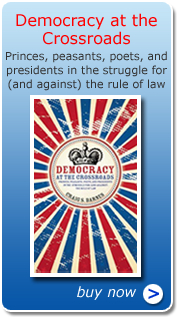It is now clear that war is the president’s intention. War, not inspection, is the goal. War because regime change is impossible without it and because this administration grants itself the unilateral right to determine which dictators it will change. War because war is the awful, sad way to win elections in America. The president’s conduct makes clear, additionally, that nothing that happens in Iraq this fall, no accommodation, no action by the UN or the allies is so important as the timing of the American election. The elections set the schedule and war—and the threat of war—is calculated to win them.
The president’s preemptive strike policy has the great advantage that it allows the President and only the President, unilaterally, to choose his timing. That timing—he has now made clear—must be October. Not because of any October information coming from Iraq, not because of any October knowledge about weapons of mass destruction or indeed of any 2002 evidence whatsoever, not because Iraq will invade any neighbor in October, not because of any dangerous situation developing in the Middle East in October, but because the American elections are in November. Republicans worry openly that they will lose control of the Congress. The president therefore will force either an attack, or a decision to attack, before October is over. He will do this not because Iraq is strong, but because it is weak and because an air war could also begin before the elections, could continue like a drum beat right through November 4 without a single US casualty. Patriots will be invited to join with Republicans to keep America strong.
This is not war to overcome any specific danger because we have not yet been afforded any concrete or specific information about such danger. It is not a war to enforce international law because that law requires inspections but the US says it is not interested in inspections. It is not a war to gain information about Saddam’s real intention because the administration says that evil intentions will in any case be presumed. It is not a war to protect Saddam’s neighbors because the neighbors have not complained and in fact have done all they could to resist the invasion. It is not a war to resist terrorism because the CIA in February reported it had uncovered no links between Saddam and terrorists. It is not even a war to protect Americans from weapons of mass destruction because the CIA has not yet issued a report saying that it believes that there are such weapons. This is a war, therefore, against a convenient foreign dictator who gives an excuse to have the planes flying literally while we go to the polls. It is a preemptive strike at the US elections.
It is an impossibility, of course, that a CIA report that does not yet exist persuaded the president to take action. He and Vice President Cheney had to have decided to go to war, therefore, months before any evidence—which has still not been produced. All of which underscores that Iraqi evidence was not and is still not the driver for this campaign. The president did not know then as he does not know today what is going on over there. What he did know, on the other hand, was the certainty of November elections and the fact that a weak economy lost his father’s election while continued war could have won it.
Ordinarily an event of such potentially generation-affecting consequences ought to be debated. The president is pressuring the US Senate and the United Nations, however, not to conduct deliberate and lengthy hearings. The democratic majority leader, Tom Daschle, agrees. Democrats must not resist the patriotic push. The president’s strategy has therefore already worked proving that democracies are not good at avoiding a war and certainly not just before elections.
Andrew Card in the White House recently confirmed the administration’s timing by saying that "August is not the time to launch a new product." He made the Iraqi war sound like an ad campaign planned by a publications relations firm. It may have been a slip of the tongue but it revealed who is in control. It is the politicians, not the generals. The Joint Chiefs, who do know about war, about death and urban combat and follow up and rebuilding, resisted this war in May. The public relations firms who do not know about war but are paid to win political campaigns have overridden the Joint Chiefs because this war is evidently more about winning over Americans than Iraqis.
